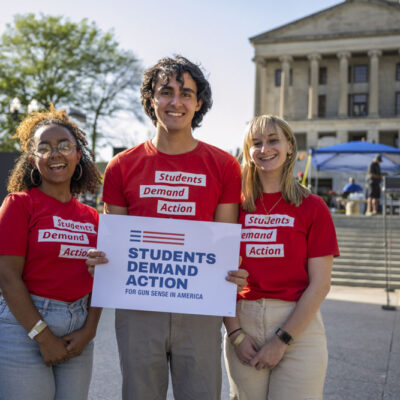25 YEARS SINCE THE MASS SHOOTING AT COLUMBINE HIGH SCHOOL IN LITTLETON, COLORADO, EVERYTOWN, MOMS DEMAND ACTION STATEMENTS
4.19.2024
NEW YORK — Everytown for Gun Safety and its grassroots networks, Moms Demand Action and Students Demand Action, released the following statements today ahead of Saturday’s 25 year mark of the mass shooting at Columbine High School in Littleton, Colorado, where 12 students and one teacher died, and 21 people were shot and wounded.
“Twenty five years ago, the fear of gun violence entered every American schoolhouse — and it’s been there ever since,” said John Feinblatt, president of Everytown for Gun Safety. “This milestone is a day for America to reckon with the fact that gun violence is now the leading cause of death for our nation’s young people, and recommit ourselves to the fight to end this completely avoidable crisis.”
“When the Columbine High School shooting happened twenty-five years ago, it was an unimaginable tragedy. Now, as gun violence continues to traumatize students and devastate our schools, families, and communities, we cannot afford to become numb to this crisis,” said Angela Ferrell-Zabala, executive director of Moms Demand Action. “We’ll keep fighting to honor the victims and survivors of Columbine with the common-sense solutions that we know work.”
“Twenty-five years doesn’t stop the hurt and there isn’t a day that goes by where I don’t miss my dad,” said Coni Sanders, whose father, Dave Sanders, was a teacher and girls’ basketball coach who was killed at Columbine High School in 1999. Coni now lives in Denver, CO, volunteers with Moms Demand Action, and is part of the Everytown Survivor Network. “I’m holding the entire Columbine community in my heart today and will continue to honor my dad’s legacy by working to prevent gun violence from devastating more families.”
“The shooting at Columbine was a watershed moment in our country and in my state. In the 25 years since, that tragedy has repeated itself over and over for far too many schools across America–including mine,” said Gracie Taub, a gun violence survivor and co-founder of the Denver East High School Students Demand Action chapter. “Gun violence is tearing our schools apart and shattering our sense of safety. But we know this crisis is preventable. Our leaders can honor the lives taken at Columbine by passing a ban on assault weapons: the weapon of choice for school shooters.”
In the wake of the horrific mass shooting at Columbine High School, America was thrown into a new era of school safety. Schools across the country implemented measures including security checks and clear backpacks. However for many years, minimal action was taken to address guns and gun violence. Since the tragedy at Columbine, school shootings continued to take place in the United States, including at Virginia Tech, Sandy Hook, Marjory Stoneman Douglas High School, Robb Elementary School, and more.
In the last couple of years, President Joe Biden has led on action to address gun violence, signing the Bipartisan Safer Communities Act, a historic gun safety, mental health, and school safety law — the first major federal gun violence prevention law to pass Congress in nearly 26 years – since before Columbine. Last week, the Biden-Harris Administration finalized a rule that will help close loopholes in our background check system.
Gun violence in all forms leaves an enduring mark on the lives of those who are personally impacted. 59 percent of adults in America, including 71 percent of Black adults and 60 percent of Latinx adults, are survivors of gun violence. Gun violence forever changes the lives of people who experience it, witness it, and are threatened by it—and the trauma from gun violence doesn’t end when the shooting stops. There were numerous secondary casualties following Columbine, including the suicide of a mother of a victim who was shot and wounded and of a student who witnessed deadly gun violence on that day. A student survivor who was wounded during the shooting also died by overdose, after succumbing to addiction after receiving medical treatment where they were prescribed opioids to help treat injuries from the shooting. Multiple students and teachers from Columbine High School also have disclosed that they suffer from PTSD. Multiple students and teachers from Columbine High School also have disclosed that they suffer from PTSD.
The Columbine High School shooting has also been linked to online radicalization and “inspiration” for following school shooters. Countless mass shooters have modeled their attacks on the deadly shooting at Columbine, including in some instances where shooters weren’t born before April of 1999.
Today, the White House Office of Gun Violence Prevention announced a new protocol for responding to mass shootings and surges in community gun violence that will ensure resources and support are ready to deploy to affected communities. Officials from the FBI and the Departments of Justice, Health and Human Services, Education, and Housing and Urban Development as well as FEMA, AmeriCorps and the Small Business Administration will also be a part of this new initiative.
As Colorado communities continue to be re-traumatized by mass shootings that capture national attention, in addition to the toll of daily gun violence that does not make the headlines, Colorado lawmakers are considering legislation to ban assault weapons. Assault weapons continue to be the weapon of choice for the deadliest mass shootings in our country, including Route 91 Harvest Music Festival, Aurora, Club Q, Pulse Nightclub, Buffalo, Uvalde, Lewiston, Parkland, and Sandy Hook. Research shows us that mass shooting deaths were 70 percent less likely with the federal assault weapons ban in place.
25 years since Columbine, guns are the leading cause of death among children and teens in Colorado. In an average year, around 930 people in Colorado die and 466 are wounded by guns in Colorado. More information about gun violence in Colorado is available here.




